牛津译林九年级上学期英语知识点汇总
牛津译林版九年级英语上册Unit1 Know yourself重点单词、词组、句型汇总
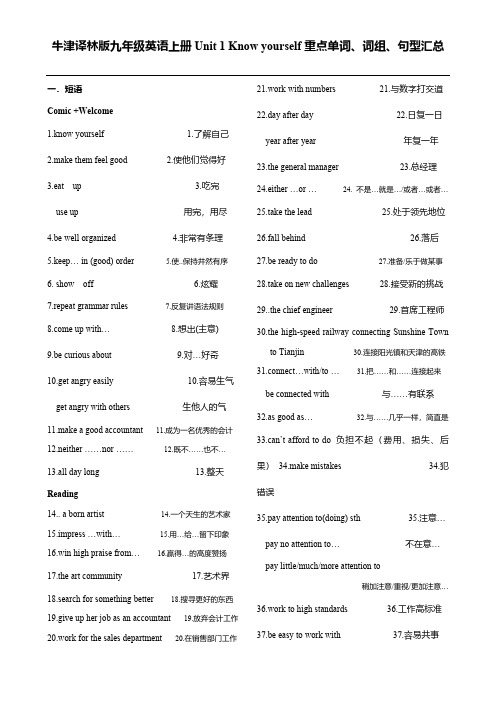
一.短语Comic +Welcome1.know yourself 1.了解自己2.make them feel good 2.使他们觉得好3.eat up 3.吃完use up 用完,用尽4.be well organized 4.非常有条理5.keep… in (good) order 5.使..保持井然有序6. show off 6.炫耀7.repeat grammar rules 7.反复讲语法规则e up with… 8.想出(主意)9.be curious about 9.对…好奇10.get angry easily 10.容易生气get angry with others 生他人的气11.make a good accountant 11.成为一名优秀的会计12.neither ……nor …… 12.既不……也不…13.all day long 13.整天Reading14.. a born artist 14.一个天生的艺术家15.impress …with… 15.用…给…留下印象16.win high praise from… 16.赢得…的高度赞扬17.the art community 17.艺术界18.search for something better 18.搜寻更好的东西19.give up her job as an accountant 19.放弃会计工作20.work for the sales department 20.在销售部门工作21.work with numbers 21.与数字打交道22.day after day 22.日复一日year after year 年复一年23.the general manager 23.总经理24.either …or … 24. 不是…就是…/或者…或者…25.take the lead 25.处于领先地位26.fall behind 26.落后27.be ready to do 27.准备/乐于做某事28.take on new challenges 28.接受新的挑战29..the chief engineer 29.首席工程师30.the high-speed railway connecting Sunshine Townto Tianjin 30.连接阳光镇和天津的高铁31.connect…with/to … 31.把……和……连接起来be connected with 与……有联系32.as good as… 32.与……几乎一样,简直是33.can’t afford to do 负担不起(费用、损失、后果)34.make mistakes 34.犯错误35.pay attention to(doing) sth 35.注意…pay no attention to… 不在意… pay little/much/more attention to稍加注意/重视/更加注意…36.work to high standards 36.工作高标准37.be easy to work with 37.容易共事38.a pioneer heart surgeon 38.心脏外科大夫的带头人39.can’t be too careful 39.再怎么细心也不为过= can never be too careful40.not only …but (also )… 40.不仅…而且…41.be willing to work extra hours 41.愿意多工作几个小时42.do operations 42.做手术43.devote oneself/one’s life/time to(doing)sth.43.把……奉献给……44.respect sb 44.尊重/尊敬…45.be happy with… 45.对…满意46.find it to difficult to do sth. 46.发现做…很难47.be suitable for(doing) sth. 47.适合与(做)…Grammar48.accept/take/follow others’ advice48.接受/采纳他人的建议49.think twice (about sth / doing sth.) 49.三思而后行50.worry too much 50过于忧虑worry about sb./sth. 担忧…51.连接主语时,谓语动词考虑就近原则;Either…or… 要么…要么…Not only… but (also)… 不仅…而且…Neither … nor… 既不…也不…连接主语时谓语复数形式Both ……and … ….和…都…52.do/wash the dishes 52.洗碗Integrated skills53.the Chinese lunar calendar 53.中国农历54.represent a lunar year 54.代表一个农历年55.appear in a fixed order 55.以固定的顺序出现56.repeat every 12 years 56.每十二年往复一次57.Chinese animal signs 57.中国的生肖58.Western star signs 58.西方的星座59.in all 59.总共,总计60.people born under the same star sign60.出生于同一生肖的人们people born in the year of the Rabbit 出生于兔年的人61.share similar personalities 61.具有相似的个性62.a cycle of… 62.…的一个循环63.depend on/upon 63.依靠…/ 取决于…64.decide your personality 64.决定你的性格65.divide ……into …… 65.把…分成…be divided into 被分成……66.read about them just for fun 66.只是为了好玩而读读他们67.shape your life 67.塑造你自己的生活65.in some ways 68.在某些方面/在某种程度上69.believe in sb. 69.信任/信奉…Study skills70.be formed by both nature由自然形成71.pass sth onto sb. 71.把某事传给某人72..Like father, like son. 73.有其父必有其子73.through hard work 73.通过辛勤的工作Task74.make/give a speech 74作演讲75.do extra work 75.做额外的工作76.help (sb). with sth. 76.帮助…做….77.win several science competitions77赢得几项科学竞赛奖78.get himself more organized 78.使他自己更加有条理79.be absent from school 79.缺课80.recommend sb as/to be … 80.推荐某人为/当…recommend sb. for a position 推荐…担任一个职务81.many strong qualities 81.许多突出的品质82.the most suitable person to be…82.做…… 最适合的人选83.agree with sb83.同意某人的看法二.句型1.It made them feel good to share things with others. 1.和他人分享东西使得他们感觉很好。
牛津译林版九年级英语上册9A Unit1考点知识归纳复习
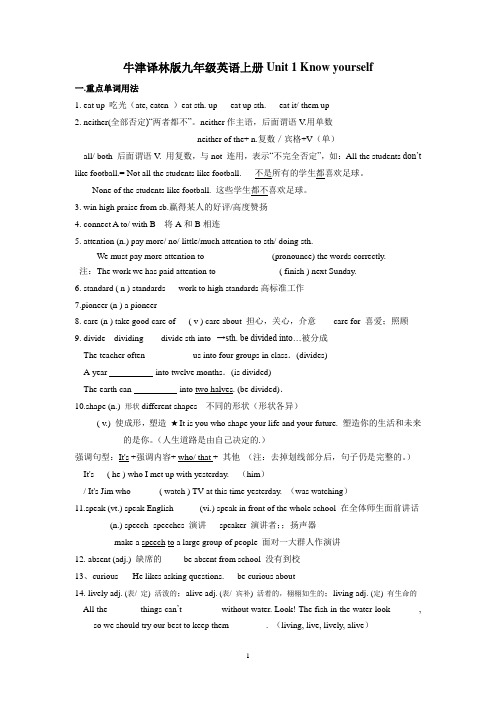
牛津译林版九年级英语上册Unit 1 Know yourself一.重点单词用法1. eat up 吃光(ate, eaten )eat sth. up eat up sth. eat it/ them up2. neither(全部否定)“两者都不”。
neither作主语,后面谓语V.用单数neither of the+ n.复数/宾格+V(单)all/ both 后面谓语V. 用复数,与not 连用,表示“不完全否定”,如:All the students don’t like football.= Not all the students like football. 不是所有的学生都喜欢足球。
None of the students like football. 这些学生都不喜欢足球。
3. win high praise from sb.赢得某人的好评/高度赞扬4. connect A to/ with B 将A和B相连5. attention (n.) pay more/ no/ little/much attention to sth/ doing sth.We must pay more attention to _______________(pronounce) the words correctly.注:The work we has paid attention to ______________( finish ) next Sunday.6. standard ( n ) standards work to high standards高标准工作7.pioneer (n ) a pioneer8. care (n ) take good care of ( v ) care about 担心,关心,介意care for 喜爱;照顾9. divide---dividing divide sth into--→sth. be divided into…被分成The teacher often __________ us into four groups in class.(divides)A year __________ into twelve months.(is divided)The earth can __________ into two halves. (be divided).10.shape (n.) 形状different shapes 不同的形状(形状各异)( v.) 使成形,塑造★It is you who shape your life and your future. 塑造你的生活和未来的是你。
牛津译林九年级上学期英语知识点汇总-Unit3
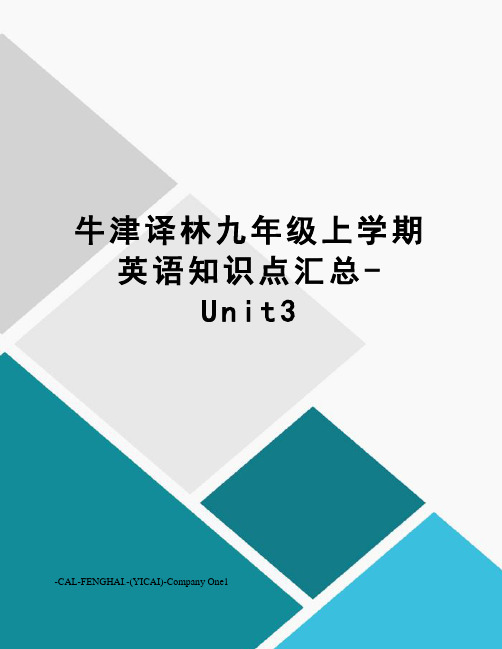
牛津译林九年级上学期英语知识点汇总-U n i t3-CAL-FENGHAI.-(YICAI)-Company One1Unit 3 Teenage problems知识点归纳一、词组、短语归纳Welcome to the unit1.get enough sleep 得到足够的睡眠2.be on (灯、电视等)开着、亮着,上演3.drive sb mad = make sb mad 把某人逼疯(gomad发疯)4.close friends 亲密的朋友5.feel lonely 感到孤独(主观)live alone 独自居住(客观)6.get low marks in exams 在考试中得低分Reading7.how … deal with…=what… do with…怎样处理……8.have no choice but to do sth 除了做某事别无选择9.stay up (late) 熬夜10.stay awake 保持清醒(作表语、宾语补足语)11.imagine (sb) doing sth 想象、设想做某事12.I often doubt whether / if it is worth spending so much time onhomework(doubt 在肯定句中接if / whether 引导的从句)There is no doubt that you can solve the problem by yourself (doubt 在否定句中接that 引导的从句)13.be (well) worth (doing) sth (很)值得做某事The Summer Palace is worth a visit 颐和园值得一游The picture is worth 20 dollars 这张图片至少值二十美元The book is well worth reading /It's well worth reading the book.这本书很值得一读。
译林版牛津初中英语九年级上册全册各单元重点短语、句型、语法归纳
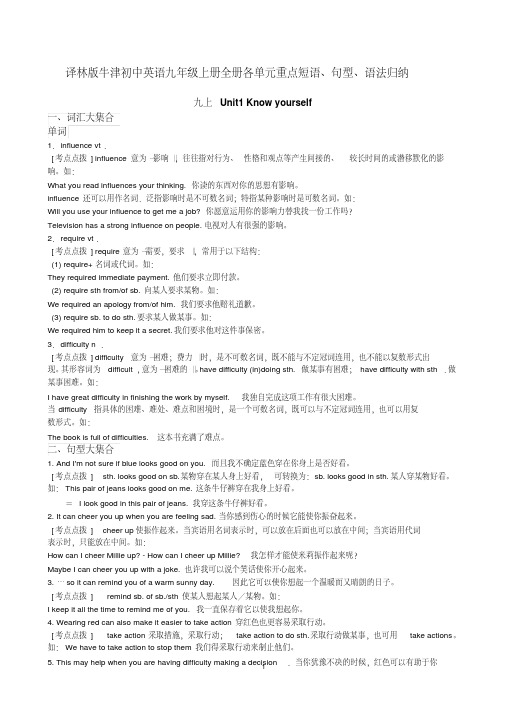
译林版牛津初中英语九年级上册全册各单元重点短语、句型、语法归纳九上Unit1 Know yourself一、词汇大集合单词1.influence vt.[考点点拨] influence意为―影响‖,往往指对行为、性格和观点等产生间接的、较长时间的或潜移默化的影响。
如:What you read influences your thinking.你读的东西对你的思想有影响。
influence还可以用作名词.泛指影响时是不可数名词;特指某种影响时是可数名词。
如:Will you use your influence to get me a job?你愿意运用你的影响力替我找一份工作吗?Television has a strong influence on people.电视对人有很强的影响。
2.require vt.[考点点拨] require意为―需要,要求‖,常用于以下结构:(1) require+名词或代词。
如:They required immediate payment.他们要求立即付款。
(2) require sth from/of sb.向某人要求某物。
如:We required an apology from/of him.我们要求他赔礼道歉。
(3) require sb. to do sth.要求某人做某事。
如:We required him to keep it a secret.我们要求他对这件事保密。
3.difficulty n.[考点点拨] difficulty意为―困难;费力‖时,是不可数名词,既不能与不定冠词连用,也不能以复数形式出现。
其形容词为difficult,意为―困难的‖。
have difficulty (in)doing sth.做某事有困难;have difficulty with sth.做某事困难。
如:I have great difficulty in finishing the work by myself.我独自完成这项工作有很大困难。
牛津译林版九年级上册英语Unit1知识点总结(单词、短语、语法句子)

*****************************单词*******************************1.Personality性格: active积极的--energetic有能量的,有活力的--serious严肃的,认真的--organized有条理的--modest谦虚的--proud自豪的--patient耐心的/impatient不耐心的---careful 细心的/carelessness粗心--confident自信的/ confidence信心--brave勇敢/ courage勇气--helpful有帮助的--hard-working努力工作的--creative有创意的/create创造/creation发明--curious好奇的--lively有活力的--powerful强大的--practical实际的,现实的/practice练习--gentle温柔的--manic/ crazy疯狂的--wise智慧的/ smart/ clever聪明的--loyal忠诚的--honest诚实的--generous慷慨的--outstanding杰出的2.Exciting令人兴奋的--excited兴奋的3.Born天生的--gift礼物;天赋--talent才艺,才华-- He is a born artist.他是个天生的艺术家。
4.Eat up吃完--use up用完--做完done5.Attention---pay attention to注意6.Appear看起来--appearance外观7.Partner--搭档-- take part in参加--join/ join in区别?8.Speech演讲lecture--speak--spoken language口语/ written language书面语9.Absent--Be absent from缺席--be presented出席10.Position职位,方位,位置11.Work职业:Accountant会计--surgeon外科医生--Pioneer先锋--engineer工程师--Member成员--General manager总经理/generally一般地--artist艺术家12.Test/exam/competition区别13.High-speed rail高速公路14.Sculpture雕塑15.Afford/ pay/ spend/ cost/ it takes sb sometime to do sth付款,担负区别16.High standard n. Adj高标准17.Respect n. Vt.尊敬,尊重18.逻辑词And, but, or, so/ though/ because/since/every19.Influence影响~ on对...影响20.Thoughts想法/ behaviours行为21.Similar类似的/ different不同的22.Sometime--sometimes--some time--some times区别23.Title标题--main heading主标题--sentence句子--paragraph段落--article文章/author作者--text 正文24.Stand for = represent 象征******************************短语******************************1.Show off炫耀2.Devote to doing sth奉献...e up with--He can always come up with exciting ideas.他总能提出令人兴奋的想法。
Unit1: 牛津译林版九年级上册的重要知识点总结

Unit1: 牛津译林版九年级上册的重要知识点总结本文档总结了牛津译林版九年级上册的重要知识点。
英语单词1. 人称代词* 主格:I, you, he, she, it, we, they* 宾格:me, you, him, her, it, us, them* 形容词性物主代词:my, your, his, her, its, our, their* 名词性物主代词:mine, yours, his, hers, its, ours, theirs2. 时态* 一般现在时:表示经常性或惯性的动作或现实存在的状态。
* 一般过去时:表示过去发生或存在的动作或状态。
* 一般将来时:表示将来要发生的动作或存在的状态。
* 现在进行时:表示现在正在进行的动作。
3. 数词* 基数词:表示数量的词,如 one, two, three 等。
* 序数词:表示顺序的词,如 first, second, third 等。
* 分数词:表示分数的词,如 half, third, quarter 等。
语法知识1. 句子结构英语句子由主语、谓语和宾语构成。
* 主语:句子的主要名词或代词,通常位于句子的开头。
* 谓语:句子的动词或动词短语,表达主语的动作或状态。
* 宾语:句子中接在动词后的名词或代词,表示动作的承受者或对象。
2. 简单句和复合句* 简单句:只包含一个主语和一个谓语的句子。
* 复合句:包含一个或多个主句和一个或多个从句的句子。
3. 名词名词是表示人、物、事物或抽象概念的词。
* 可数名词:可以用单数或复数形式来表示的名词。
* 不可数名词:只有单数形式的名词,表示一种抽象的概念或不能具体计数的物质。
阅读技巧1. 主旨大意阅读文章时,要通过理解文章中的关键信息,归纳总结出文章的主旨大意。
2. 推理判断在阅读过程中,根据已有的信息和推理能力,进行合理的判断和推断。
3. 词汇理解根据上下文和词汇之间的关系,理解文章中出现的生词或不熟悉的词汇的意思。
牛津译林版九年级英语上册常考考点归纳(一) 江苏省

1. I’ll have lots to eat and drink today. 我今天将有很多吃吃喝喝的东西。
划线部分动词不定式作后置定语,往往表示未发生,将发生的动作。
I have a lot of work to do. 我有很多工作要做。
She needed someone to help her take care of her baby. 她需要某个人帮她照顾婴儿。
2. worry about (not) doing sth. 担心(不)做某事be worried about=worry about 为…而担心We are worried about the coming exam.=We worry about the coming exam.我们为即将到来的考试而担心。
worry sb. 使某人担心I don't know what is worrying her. 我不知道是什么使她担心。
worrying 令人不安的I could not fall asleep because of the worrying things.由于这些烦心事,我睡不着觉。
3. divide sth. into... 把...分为...The teacher divided these students into three groups. 老师把这些学生分成三组。
be divided into... 被分为...A year is divided into four seasons. 一年被划分成四个季节。
4. argue with sb. 与某人争论Don't argue with your parents. 不要和你的父母争论。
argue about sth. 就某事争论We argued with the waiter about the price of the meal.就这顿饭的价格问题,我们与服务员发生了争执。
牛津译林九年级上学期英语知识点汇总-Unit6

牛津译林九年级上学期英语知识点汇总-U n i t6-CAL-FENGHAI.-(YICAI)-Company One1Unit 6 TV programs重要知识点归纳一、词组、短语归纳Welcome to the unit programs 电视节目2.get bored with (doing ) sth 对(做)...感到厌倦3. stay at home all day 整天呆在家4. as busy as 像... 一样忙busy-busier--the busiest busy--free空闲的5. be busy doing sth 忙于做某事6. be busy with sth 忙于某事7. too busy to do sth 太忙了而不能做某事8. too busy doing sth to do sth 太忙于做某事而不能做某事9.have nothing to do 无事可做10.watch sports on TV 看电视体育节目11.have a little sleep 小睡一会12. need a little sleep 需要一点点睡眠13.types of TV programs 电视节目种类14. enjoy watching documentaries 喜欢看纪录片15. after that 在那之后 after doing sth 在做...之后16. talk about their lives 谈论关于他们的生活17. learn a lot about nature 了解许多关于大自然18.learn a lot from ... 从...学到许多19. real-life events 真实的生活事件20. answer all the questions correctly 正确地回答所有的问题21. win a big prize 赢得一个大奖22. get the first prize 得一等奖/得第一名23.too much dialogue 太多对话24.read the dialogue(s) loudly 大声读对话25.make up a dialogue 编一个对话26.what type of TV programs 哪种电视节目27.on these chat shows 在这些访谈节目里28.take part in one of them 参加他们之一Reading29.read a TV guide online 读在线节目导视30.Sports World 体育世界31.a weekly round-up 一周要闻综述32.cover different sports 涉及不同的运动33.with up-to-date information=with the latest information (带有)最新信息34.miss this week’s programme 错过本周的节目35.a number of许多 +名词复数(做主语表示复数)A number of wild animals are killed every day 每天许多的野生动物被杀the number of ... ...的数量+名词复数(做主语表示单数)修饰词用big/ large表示多,small 表示少The number of students is becoming smaller and smaller. 学生的数量正变得越来越少36.interviews with famous players 对著名运动员的采访 have an interview with sb--interview sb 采访某人37.a report on 一个关于...的报告will be includedThe band played many songs, including some of my favourites.乐队唱了很多的歌,包括我喜欢的一些歌40.football fan 一个足球迷41.this year's Beijing Music Awards 今年的北京音乐颁奖晚会42.cover live现场直播 be covered live 被现场直播be covered with sth 被...覆盖43.The ground is covered with leaves in autumn.44.many Asian pop stars 许多亚洲流行明星45.this coming Saturday 即将来临的这个星期六46.attend the meeting/a wedding 参加会议/婚礼47.vote online for…在线为….投票48.announce the results 宣布结果49.The results will be announced in two hours. 结果将在两个小时后宣布50.send text messages to 1396 发送文本信息到139651.send ...to ...发送...到... send for sb. 派人去请send away 开除,解雇,赶走 send up 发射52.while watching the show 当观看表演时53.write down your answers 写下你的答案54.win two free concert tickets 赢得两张免费音乐会票55.murder in a country house 在乡村小屋的谋杀56.a horror film directed by 一部由…导演的恐怖片57.direct a film 导演一部电影a film directed by a famous director 一部由一个著名导演导演的电影a wealthy doctor--a rich doctor 一个富有的医生58.wealth 财富 health健康 healthy healthily59.be found dead /dying 被发现死了/ 要死了died死了---has been dead 已经死了60.find out the answer 弄清楚/找出答案61.be full of horror and mysteries 充满恐怖和神密be full of = be filled with 充满62.enjoy solving mysteries 喜欢解谜;揭开谜底63.get scared easily 容易受惊吓64.the end of the film 电影的结尾65.a one-hour documentary 一个一小时的记录片66.take a close look at…近距离地看一看67.the life of tigers in India 在印度老虎的生活68.face danger 面临危险 face to face 面对面69.how much danger 多少危险70.unless humans stop hunting them 除非人类停止猎杀它们71.hunt them for their fur and bones 猎取他们毛和骨72.feel sad about it 对此感到悲伤73.see scenes from India 看见来自印度的风光74.one of the few places 较少的地方之一75.win an award for 因…而获奖76.say sth in a low voice 用低声说某事77.send out later稍后发出14.cry for help 尖叫求助78.Jack doesn’t mind feeling scared 杰克不介意感到恐惧Grammarplete ...quickly 快速完成....80.introduce ...to... 向。
译林版牛津初中英语九年级上册全册各单元重点短语、句型、语法归纳

译林,版,牛津,初中,英语,九年级,上册,全册,各,译林版牛津初中英语九年级上册全册各单元重点短语、句型、语法归纳九上 Unit1 Know yourself一、词汇大集合单词1.influence vt.[考点点拨] influence意为“影响”,往往指对行为、性格和观点等产生间接的、较长时间的或潜移默化的影响。
如:What you read influences your thinking.你读的东西对你的思想有影响。
influence还可以用作名词.泛指影响时是不可数名词;特指某种影响时是可数名词。
如:Will you use your influence to get me a job?你愿意运用你的影响力替我找一份工作吗?Television has a strong influence on people.电视对人有很强的影响。
2.require vt.[考点点拨] require意为“需要,要求”,常用于以下结构:(1) require+名词或代词。
如:They required immediate payment.他们要求立即付款。
(2) require sth from/of sb.向某人要求某物。
如:We required an apology from/of him.我们要求他赔礼道歉。
(3) require sb. to do sth.要求某人做某事。
如:We required him to keep it a secret.我们要求他对这件事保密。
3.difficulty n.[考点点拨] difficulty意为“困难;费力”时,是不可数名词,既不能与不定冠词连用,也不能以复数形式出现。
其形容词为difficult,意为“困难的”。
have difficulty (in)doing sth.做某事有困难;have difficulty with sth.做某事困难。
牛津译林版九年级英语上册Unit1知识点梳理汇总(含答案)
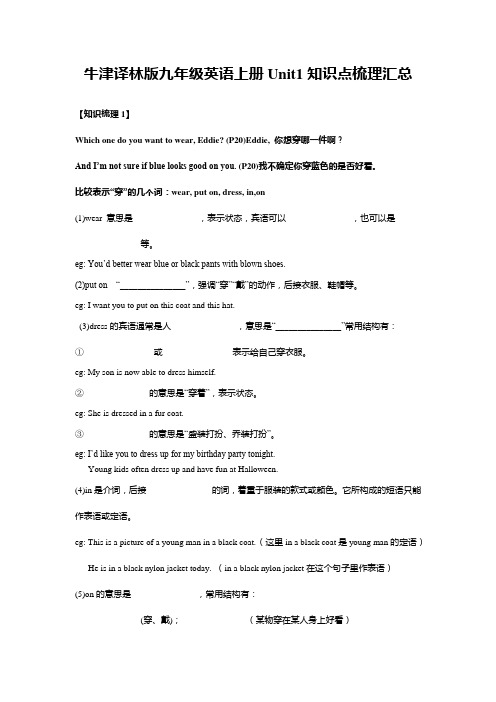
牛津译林版九年级英语上册Unit1知识点梳理汇总【知识梳理1】Which one do you want to wear, Eddie? (P20)Eddie, 你想穿哪一件啊?And I’m not sure if blue looks good on you. (P20)我不确定你穿蓝色的是否好看。
比较表示“穿”的几个词:wear, put on, dress, in,on(1)wear 意思是_______________,表示状态,宾语可以_______________,也可以是_______________等。
eg: You’d better wear blue or black pants with blown shoes.(2)put on “_______________”,强调“穿”“戴”的动作,后接衣服、鞋帽等。
eg: I want you to put on this coat and this hat.(3)dress的宾语通常是人_______________,意思是“_______________”常用结构有:①_______________ 或_______________表示给自己穿衣服。
eg: My son is now able to dress himself.②_______________的意思是“穿着”,表示状态。
eg: She is dressed in a fur coat.③_______________的意思是“盛装打扮、乔装打扮”。
eg: I’d like you to dress up for my birthday party tonight.Young kids often dress up and have fun at Halloween.(4)in是介词,后接_______________的词,着重于服装的款式或颜色。
它所构成的短语只能作表语或定语。
牛津译林版九年级英语上册全书语法知识点归纳大全(9A Unit 1 8)

牛津译林版九年级英语上册全书语法知识点归纳大全(9A Unit 18)牛津译林版九年级英语上册全书语法知识点归纳大全(9aunit1-8)牛津大学伊林版九年级英语第一册语法知识点综述u1语法和知识点复习语法:1.and表示并列关系,用于肯定句中。
ilikeapplesandbananas.2.or表示选择关系,youcanstayathomeorgoout.或者在否定句中也指并列。
我不喜欢吃香蕉。
3.但这表明了一个转折点。
heisveryyoung,butheknowsalot。
4.这表明了因果关系。
他上大学了。
当谓语是复数形式时,它连接两个主语。
例如:高和低都努力学习6.neither…nor….和either…or…和notonly…butalso连接两个主语时,谓语动词要和最近的主语保持一致(就近原则)例如:neithermyparentsnorshe(know)it知识点:1.瞧,这是“不吸烟”。
a、说话。
saysc。
写背诵:在英语中,报纸,杂志,广告等上面“写着”常用动词say,且多用一般现在时态。
、2.make做“使,让”的三种用法:a.makesb+形容词b.makesb+动词原形。
c.bemadetodosth.例如:itmakesthem(feel)goodtosharethingswithothers.3.let做“make,let”时,句型:letsbdosth 4。
同意某人的意见同意某人的意见12..itiskindyoutohelpmeitisterriblemetoworkwithoutspeakingalldaylong背诵:Its+形容词+for/of sbtosth如果形容词是关于人的素质的,使用;如果形容词是描述性的,则用于13.背诵:hedoesn’tliketotalkmuch,buthisworkshouts.=他不喜欢讲太多,但是他的作品极具说服力。
14.iamalwayssearchingforsomethingdifferent.我总是在寻找一些不同的东西15.放弃=giveup用法:a.giveupdoingsthb.giveitup16.领先=takethelead17.落后=fallbehind准备好做某事接受新的挑战20.失之毫厘谬以千里=amissisasgoodasamile21.我们不能犯任何错误。
(完整word版)牛津译林九年级上学期英语知识点汇总-Unit6,推荐文档

、词组、短语归纳Unit 6 TV programs 重要知识点归纳Welcome to the un it1. TV programs2. get bored with (do ing ) sth3. stay at home all day4. as busy as 像...busy-busier--the busiest busy--free5. be busy doing sth6. be busy with sth7. too busy to do sth8. too busy doing sth to do sth9. h ave nothing to do ___10. watch sports on TV11. have a little sleep12. n eed a little sleep13. types of TV programs14. enjoy watch ing docume ntaries15. after that 在那之后after doing sth16. talk about their lives ____17. lear n a lot about n ature18.learn a lot from ...19. real-life eve nts20. answer all the questi ons correctly ____21. win a big prize22. get the first prize23. too much dialogue24. r ead the dialogue(s) loudly25. m ake up a dialogue26. what type of TV programs27. o n these chat shows28. take part in one of themReadi ng29. read a TV guide online30. Sports World31. a weekly round-up32. cover different sports33. with up-to-date information= ____with the latest i nformati on34. miss this week ' s programme电视节目对(做)...感到厌倦整天呆在家一样忙空闲的忙于做某事忙于某事太忙了而不能做某事太忙于做某事而不能做某事无事可做看电视体育节目小睡一会需要一点点睡眠电视节目种类喜欢看纪录片在做…之后谈论关于他们的生活了解许多关于大自然从…学到许多真实的生活事件正确地回答所有的问题赢得一个大奖得一等奖/得第一名太多对话大声读对话编一个对话哪种电视节目在这些访谈节目里参加他们之一读在线节目导视体育世界一周要闻综述涉及不同的运动(带有)最新信息错过本周的节目35. a number of 许多+名词复数(做主语表示复数)A number of wild animals are killed every day 每天许多的野生动物被杀the number of ....... +big/ large small65. 66.示少 The nu mber of stude nts is beco ming smaller andsmaller. 学生的数量正变得越来越少36. in terviews with famous players have an in terview with sb--i nterview sb 37. a report o ___—个关于...的报告 38. will be included 将被包括 对著名运动员的采访 采访某人 in clude sth. 包括某事在内 in clude 前面要有主语 The uni versity in cludes ten colleges.10个学院including 用在逗号后面, 39. 该大学有 40. 41. 42. The band played many son gs, in cludi ng some of my favourites.包括我喜欢的一些歌 football fan —个足球迷 this year's Beiji ng Music Awards cover live 现场直播 be covered live 这个乐队唱了很多的歌, be covered with sth今年的北京音乐颁奖晚会 被现场直播 被…覆盖43. 44. 45. 46. 47. The ground is covered with leaves in autum n. many Asia n pop stars this coming Saturday attend the meeti ng/a wedd ing vote on li ne for…48. 49. announce the results The results will be announced in two hours. 50. 51. 52. 53. 54. send text messages to 1396 send ...to ... 发送...至U... send for sb. send away 开除,解雇,赶走 send upwhile watching the show write dow n your an swers win two free con cert tickets 55. 56. 57. murder in a country house a horror film directed by direct a film58. 59. 60. 61. a film directed by a famous director a wealthy doctor--a rich doctor wealth 财富 health 健康 healthy be found dead /dying died 死了 ---has been dead find out the an swerbe full of horror and mysteries be full of = be filled with 62. 63. 64. enjoy solv ing mysteries get scared easily the end of the filma_pn e-hour docume ntary take a closelook at 67. the life of tigers in In dia许多亚洲流行明星 即将来临的这个星期六 参加会议/婚礼 在线为….投票宣布结果______ 结果将在两个小时后宣布发送文本信息到1396 派人去请 发射当观看表演时 写下你的答案赢得两张免费音乐会票 在乡村小屋的谋杀 一部由…导演的恐怖片 导演一部电影一部由一个著名导演导演的电影 一个富有的医生healthily被发现死了 /要死了 已经死了 弄清楚/找出答案 充满恐怖和神密充满喜欢解谜;揭开谜底 容易受惊吓电影的结尾一个一小时的记录片 近距离地看一看68. 69. 70. 71. face dan ger 面临危险 face to facehow much dan geruni ess huma ns stop hun ti ng them hunt them for their fur and bones 面对面 多少危险除非人类停止猎杀它们 猎取他们毛和骨 72. feel sad about it 对此感到悲伤 73. see scenes from In dia 看见来自印度的风光 74. one of the few places 较少的地方之 75. win an award for 因…而获奖 76. 77. 78. say sth in a low voice send out later 稍后发出 14.cry for help Jack doesn ' t mind feeling scared 用低声说某事 尖叫求助杰克不介意感到恐惧Grammar 79. 80. complete ...quicklyin troduce ...to... 81. dan ger-- safety be in dan ger 处于危险中 out of dan ger 安全dangerous 危险的--safe 82. The most dangerous place is the safest one. dangerously 危险地---safely 安全地 83. 84. 快速完成....向。
牛津译林版九年级上册英语期中复习9 A Unit 1-Unit 4 知识点总结!
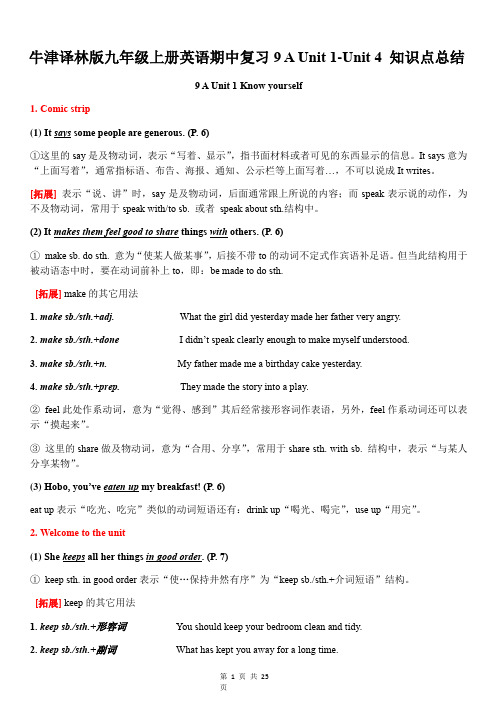
牛津译林版九年级上册英语期中复习9 A Unit 1-Unit 4 知识点总结9 A Unit 1 Know yourselfic strip(1)It says some people are generous. (P. 6)①这里的say是及物动词,表示“写着、显示”,指书面材料或者可见的东西显示的信息。
It says意为“上面写着”,通常指标语、布告、海报、通知、公示栏等上面写着…,不可以说成It writes。
[拓展] 表示“说、讲”时,say是及物动词,后面通常跟上所说的内容;而speak表示说的动作,为不及物动词,常用于speak with/to sb. 或者speak about sth.结构中。
(2) It makes them feel good to share things with others. (P. 6)①make sb. do sth. 意为“使某人做某事”,后接不带to的动词不定式作宾语补足语。
但当此结构用于被动语态中时,要在动词前补上to,即:be made to do sth.[拓展] make的其它用法1. make sb./sth.+adj. What the girl did yesterday made her father very angry.2. make sb./sth.+done I didn’t speak clearly enough to make myself understood.3. make sb./sth.+n. My father made me a birthday cake yesterday.4. make sb./sth.+prep. They made the story into a play.②feel此处作系动词,意为“觉得、感到”其后经常接形容词作表语,另外,feel作系动词还可以表示“摸起来”。
③这里的share做及物动词,意为“合用、分享”,常用于share sth. with sb. 结构中,表示“与某人分享某物”。
- 1、下载文档前请自行甄别文档内容的完整性,平台不提供额外的编辑、内容补充、找答案等附加服务。
- 2、"仅部分预览"的文档,不可在线预览部分如存在完整性等问题,可反馈申请退款(可完整预览的文档不适用该条件!)。
- 3、如文档侵犯您的权益,请联系客服反馈,我们会尽快为您处理(人工客服工作时间:9:00-18:30)。
新译林英语9A UNIT1-UNIT8 词组重点句型知识点归纳Unit 1 Know yourself 知识点汇总一、词组、短语归纳Welcome to the unit1. It says 上面写着,上面显示2. eat up 吃光,吃完(use up 用完,用尽)3. be well organized 很有条理的4. keep ⋯in good order 使⋯⋯保持井然有序(in order 按顺序)5. show off 炫耀,卖弄6. show sb around sp 带领某人参观某地7. show sb the way to 给某人指到某地的路8. show no interest in对⋯⋯毫不感兴趣9. repeat grammar rulers for us 为我们重复语法规则10. come up with = think of 想出,提出;11. be curious about对⋯感到好奇12. get angry easily 容易生气13. make a good accountant 成为一名优秀的医生14. neither ⋯⋯nor ⋯⋯既不⋯⋯也不⋯⋯(就近原则)Neither he nor I am well educated.He didn ’t come here yesterday , neither / nor d i d.他I昨天没来这儿,我也是15. work without speaking all day long 整天工作不说话Reading16. be happy with = be satisfied with对⋯⋯感到满意17. a born artist 一个天生的艺术家18. impress the whole country with his creative work 他的富有创造力的作品给全国人民留下深刻的印象19. win high praise from the art community 赢得艺术团的高度赞扬20. praise sb for sth 因某事表扬某人21. give up 放弃(代词放中间)22. give up doing sth = stop doing sth 放弃做某事23. work for the sales department in a big company 在一家大公司的销售部工作24. day after day 日复一日25. the general manager 总经理26. either ⋯⋯or ⋯⋯要么⋯要么⋯,或者⋯或者⋯(就近原则)27. take the lead 处于领先地位,带头28. fall behind 落后(fall in 生病)29. be ready to do 准备做某事30. take on new challenges 接受新的挑战31. the chief engineer 首席工程师32. connect ⋯⋯with/to ⋯⋯把⋯⋯和⋯⋯连接起来33. be connected with 与⋯⋯有联系34. a miss is as good as a mile 差之豪厘,谬以千里35. as good as 与⋯⋯几乎一样,简直是36. can ’t f a of r d to do 负担得起(费用、损失、后果)多用于否定句和疑问句中37. make mistakes 犯错误38. pay attention to every detail 注意每个细节(to 为介词+ doing sth )39. work to high standards 工作高标准40. easy to work with 容易一起工作41. a pioneer heart surgeon 一位心脏外科手术的带头人42. can ’t be too carel f u= can never be too careful 再怎么细心也不为过43. be willing to do sth 愿意做某事44. devote oneself/ one ’s life /toti m e 把⋯⋯奉献给⋯⋯(to 为介词,后接名词,代词,动名词)45. respect sb = have / show respect for sb 尊重,尊敬某人46. be suitable for 适合Grammar and Integrated Skills and Study Skills47. accept others ’ advice 接受别人的建议48. think twice (about sth ) 三思而行49. be /get angry with sb 生某人的的气50. be /get angry at/ about sth 因某事而生气51. worry too much 担心太多52. be patient / impatient with对⋯⋯有/ 没有耐心53. both ⋯⋯and ⋯⋯连接两个主语时,谓语动词用复数形式54. not only ⋯⋯but (also ) ⋯⋯不但⋯⋯而且⋯⋯(就近原则)55. do the washes 洗碗,洗餐具56. animal signs 生肖57. appear in a fixed order 按照固定的顺序出现58. make his lesson lively and interesting 使他的课上得生动而有趣(lively 活泼的,生气勃勃的指人或物)59. in all 总共,总计60. people born under the same star sign 出生在同一星座下的人们61. share similar personalities 具有相似的个性62. be similar to 与⋯⋯相似63. be similar in 在某方面相似64. depend on 依靠65. lunar calendar农历66. be divided into 被分成67. divide ⋯⋯into ⋯⋯把⋯⋯分成⋯⋯68. It ’s you who shape your life and your f t u u re你的生活和将来都掌握在你的手中(强调句型)Task69. It ’s said that 据说70. make a speech = give a speech 作演讲71. do extra work 做额外的工作72. win several science competitions 赢得几项科学竞赛73. get himself more organized 使他自己更加有条理74. be absent from school 缺席75. recommend sb as ⋯推荐某人为/当⋯76. recommend sb for ⋯推荐某人获⋯奖77. agree with sb 同意某人的看法、意见;适应(食物、气候)Useful sentences:78. It makes them feel good to share things with others. 和别人分享让他们感觉很好。
79. She keeps all her things in good order,她使得所有的东西井然有序。
80. Neither my parents nor I think I can make a good accountant. 我和我父母都不认为我能成为一名优秀的会计。
81. It's terrible for me to work without speaking all day long. 对我来说 ,整天工作不说话太可怕了。
82. His sculptures for Sunshine Town Square have won high praise from the art community. 他给阳光镇广场做的雕塑赢得了艺术协会的高度赞扬。
83. Life is like a race. You either take the lead or fall behind. 人生就像一场赛跑。
你要么领先要么落后。
84. To us, a miss is as good as a mile.对我们来说,失之毫厘 ,谬以千里。
85. All of us know that it's necessary to pay attention to every detail. 我们所有人都知道注意每个细节的必要性。
86. She has devoted most of her time to her work. 她把她大部分的时间都奉献给了工作。
87. They appear in a fixed order and the cycle repeats every 12 years. 它们按照固定的顺序,每12 年循环一次。
88. It is said that people born in the Year of the Tiger are brave. 据说出生在虎年的人很勇敢。
89. He is not afraid of making a speech in front of many people 。
他不害怕在许多人面前做演讲。
90. We hope that you agree with us.我们希望你能同意我们。
二、知识点1.eat up(1)eat all of 吃光Make sure the children eat their vegetables up !一定要让孩子们把蔬菜吃光。
After working all afternoon ,we quickly ate up all of the dinner. 我们整整干了一个下午以后,一会儿就把饭吃光了。
(2)use all of 用完;消耗Extravagance ate up his inheritance.奢侈的生活耗尽了他继承的遗产。
The central heating eats up a lot of electricity .暖气耗费大量的电力。
Idle talk had eaten up the hour before they knew it .闲谈不知不觉地把他们的时间都耗掉了。
2.creative adj. create v.3.energetic adj. energy n.能量;活力; 精力; 精神; 复数:e nergiese up with 想出/think of区别:catch up 和 catch up with 都是赶上的意思(由其指功课、进度)catch up with 后面可以接人就是赶上某某人的意思 catchup:If you miss a lot of classes, it's very difficult to catch up.catch up with:At the moment our technology is more advanced, but other countries are catching up with us.5.neitherNeither ⋯⋯nor ⋯/either ⋯..or ⋯/ both ⋯and..both...and 指的是两者都是neither...nor 指的是两者都不是(就近远则) either...or指的是两者之一(就近原则)neither of 指的是没有一个,三者或三者以上都不是(就近原则)就近原则指的是be 动词和行为动词的用法取决于距离较近的主语的单复数。
